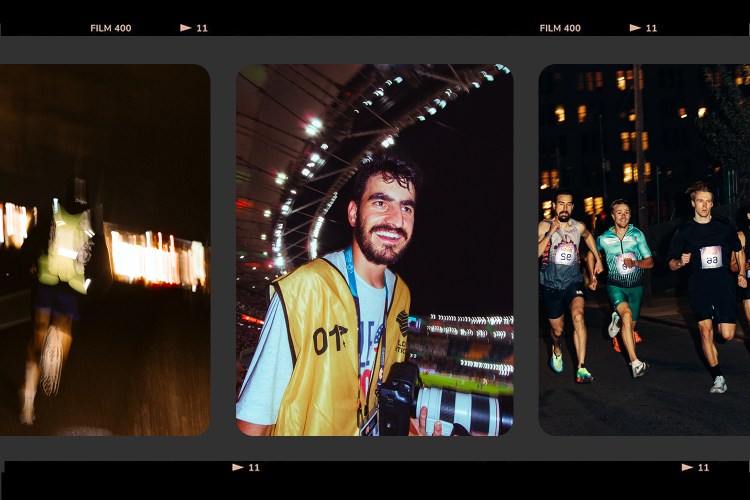Frustrated journalist from Detroit walks into a bar in Africa. Meets a kid in a heavy metal band. Decides to make a movie about the kid and orphans who play heavy metal. Meet Jeremy Xido, InsideHook’s Man of the Month for October.
Jeremy Xido’s first feature film was supposed to be about Angola’s railroads.
Not its death metal scene.
But while marooned in 2009 in Huambo – the country’s second largest city and a main hub on its longest railway – the filmmaker strolled into a bar looking for a cup of coffee.
There was only one café in town: The Imperial, where the expats go. “Deep mining officers, Lebanese businessmen, Angolan military dons.”
The Mos Eisley of Angola.
And then a young man in dreadlocks and a blue oxford waved Xido over to his table.
“He was a musician. I asked him what kind of music he played, and he said ‘death metal.’”
“It was like the world stopped.”
Now 40, Xido splits his time between New York and Vienna, the dual headquarters of Cabula6, a performing arts and film collaborative he co-founded in 2006.
He grew up in Detroit, where he and his friends used to slap down cardboard on street corners and day-trip to Chicago to breakdance for money. “I was the only white kid in my neighborhood,” he says. “My ability to dance, move, was essential to my sense of community and belonging.”
Jeremy speaks of his childhood with a keen self-awareness, charting the course of events that eventually led to the production of Death Metal Angola (watch the trailer here), a film about the war-torn country’s nascent rock scene – but also a film deeply more personal than meets the eye.
He estimates the ethnic makeup of his corner of Detroit as half Muslim and half black. “I wasn’t completely aware of the fact that I was white. Where I grew up, everyone talked about going back to Africa, and so did I.”
And so, eventually, he did.
Angola – a country of some 18 million people located on Africa’s southern Atlantic coast – achieved sovereignty in 1975. But internal conflict between two former liberation movements quickly devolved into a violent Civil War that wouldn’t reach resolution until 2002.
In the decade since, Angola has burgeoned into one of Africa’s cultural and economic luminaries. Rich in crude oil and arable land, it has attracted the attention of foreign investors, including Chinese construction companies, who promised to rebuild the country’s devastated infrastructure in exchange for oil works.
That is what brought Xido to Angola, where he planned on tracing the progress of the Benguela Railway, which runs from coastal Lobito to the Congolese border.
But then he met Wilker – the young man from the café with a modest, if quixotic, dream: to put on the country’s first ever National Rock Festival.
Death Metal Angola is, somewhat unexpectedly, a film about an orphanage.
Wilker lives with his girlfriend Sonia at Okutiuka, a dilapidated commune where she is mother to 56 children whose parents were left dead or destitute by the war.
The country of Angola, too, acts as a kind of orphan, bereft not only of industry and infrastructure, but also its cultural and artistic identity.
In heavy metal, an upstart subculture of Angolans have discovered a new channel for artistic expression: something that is entirely theirs, and, moreover, a medium raw enough to withstand the considerable trauma that has defined their history.
For Xido, the music enables Wilker and his peers to “touch this primal place … to have permission to speak out publicly and be accepted. It allows (them) to stop holding on, and allows for a certain freedom. It’s ultimately cleansing.”
It works in symmetry to Jeremy’s own adolescence: young artist embraces movement perceived to belong to another culture, forges an identity in doing so.
The paradox is magnified in the case of the Angolan death metal merchants, the genre having cut its teeth in Poland and Scandinavia.
“The notion of cultural authenticity gets completely thrown out the window,” Xido says. “And that is very much an important element of me, growing up. The way I looked on the outside was not necessarily who I was.”
So who is he?
Son of Transylvanian immigrants. New Yorker by way of Angola, Vienna, Barcelona, Detroit. Filmmaker. Performance artist (see his upcoming The Angola Project). Quadrilinguist. Breakdancer.
And converted metalhead.
Death Metal Angola, a darling of the 2013 festival circuit, debuts in New York November 16th at DOC NYC. The Fulbright Association (which counts Xido among its alumni) will host a panel discussion on the film November 18th. Festival dates and wider distribution for the film are also in the works. Go here for more info.
You can also donate to Okutiuka through DMA’s site here.
Whether you’re looking to get into shape, or just get out of a funk, The Charge has got you covered. Sign up for our new wellness newsletter today.



















